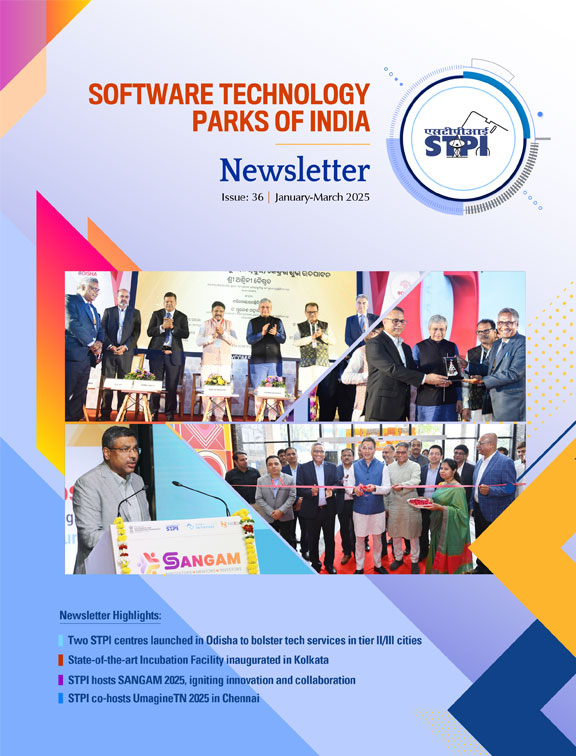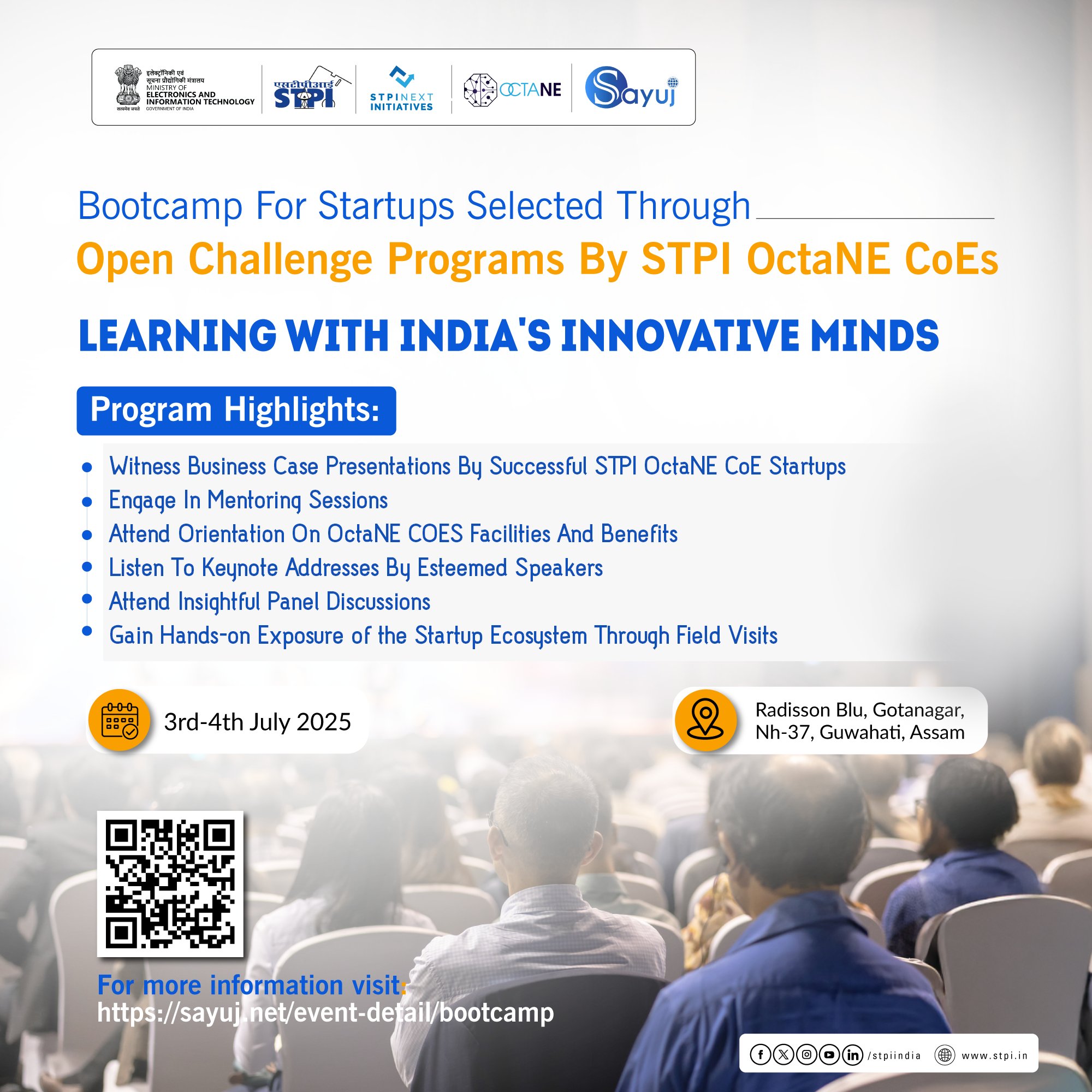
Main
STPI aims to spread IT sector growth nationwide
STPI aims to spread IT sector growth nationwide
- 12-07-2025
The MeitY wing’s new role is to take the industry from tier one cities to tier two, tier three cities, and grow the tech industry countrywide,
says its Director General Arvind Kumar
Software Technology Parks of India, a body set up under the Ministry of Electronics and Information Technology in 1991 originally to promote the growth of tech sector by offering software certification, tax holidays and incentives and high speed data connections, is now repositioning itself to be able to drive the next wave of digital transformation that is set to sweep across the country.
“STPI has embarked on its next wave of growth with a mandate to make IT growth truly inclusive in the country. Our 2.0 growth focus is to trigger entrepreneurship in software, products and business process management (BPM) spaces nationwide, not just in big cities. We will fuel this growth by offering incubation facilities, infrastructure, training, skilling, mentoring, funding, and market connect. This will also lead to a huge amount of job creation and additional economic growth in the country,” Arvind Kumar, Director General, STPI, told The Hindu.
According to him, there was an immediate need to shift IT and IT enabled services (ITeS) to smaller cities and towns and STPI has been encouraging and assisting entrepreneurs towards this move.
STPI, since its inception some 34 years ago, played a pivotal role in transforming India’s IT sector - a sunrise sector in the early ‘90s. Its registered units achieved software exports of over ₹10.59 lakh crore in FY 2024–25, accounting for $110 billion of the country’s total software exports of over $200 billion. Software exports worth some $90 billion come from companies operating within special economic zones.
Teething troubles
Recalling the mammoth growth the industry witnessed, Mr. Kumar said those were early years, but crucial as the industry was in its infancy.
“At that time, the challenges faced by the industry were different. No one knew how to export software or how to certify and fix a value for it. Desktops and laptops were all imported and unaffordable for most entrepreneurs. There was a need to establish connections with various state governments to ensure tax holiday/incentives. STPI alone had a reliable broadband connection those days,” he said.
Although STPI began three decades ago, it had operations only in Bengaluru, Pune and Bhubaneswar for many years. While today it has 67 centres, 59 of these are in tier two and three cities.
New growth centres
“Now the government is looking at why the growth is not happening in Lucknow, Chandigarh, or other tier two and three cities. So, STPI’s new role is to take this industry from tier one cities to tier two, tier three cities and grow the tech industry countrywide,” he added.
As a preparatory measure, STPI has already created some 17 lakh square feet incubation space in tier two and three cities to accommodate small tech, product or BPM entrepreneurs or micro, small and medium enterprises who can start their firms. “This will provide support to youngsters who are passing out from engineering colleges in small towns and give them a quick start,” Mr. Kumar said.
Product push
STPI has created 24 centres of entrepreneurship nationwide to encourage a start-up culture in the product space. In the last three years, STPI has supported around 1,500 start-ups and those have created around 800 IPRs and over 2,000 product innovations. These firms have raised over ₹600 crore in funding and generated ₹565 crore in revenues in the last three years. “So a lot of things are happening in the product side and a lot of things are happening in the start-up domain as well,” Mr. Kumar added.
He said, while the country’s IT/ITeS services exports have now touched nearly $224 billion, software products lag behind at $17 billion, with product exports contributing roughly $12 billion.
STPI was aspiring to become the largest technology start-up ecosystem in the country and has been endeavouring to transform the country into a software product nation as envisaged in the National Policy on Software Products (NPSP) 2019, Mr. Kumar said.
Chains of Trust & Transformation
Chains of Trust & Transformation
- 16-07-2025
India’s blockchain revolution is gaining momentum with STPI’s Apiary CoE augmenting deeptech startups—positioning the nation as a global leader in secure, transparent, and inclusive digital transformation
In today’s era where data holds paramount value, conventional models of governance, security, and service delivery are rapidly evolving. Blockchain technology has emerged as a foundational layer of trust in this transformation. It is no longer limited to cryptocurrencies—it is redefining the way India envisions secure, transparent, and inclusive digital systems.
The Government of India has recognised this potential early on. Through key frameworks like the National Blockchain Strategy and Digital Public Infrastructure (DPI), India is integrating blockchain into governance, trade, and financial systems. Innovative pilots such as Praamaanik (for app authentication) and the Vishvasya Blockchain Stack (Blockchain-as-a-Service platform) reflect the Government’s commitment to making blockchain a core pillar of Digital India.
India’s blockchain market is poised for exponential growth, with a CAGR of 82.3% projected from 2022 to 2030, according to the report India Blockchain Technology Market Forecast 2030. As the world embraces decentralisation, blockchain is gaining relevance across various sectors, including finance, agriculture, education, sustainability, supply chain management, and healthcare. Globally, the blockchain market is expected to surpass USD 67 billion by 2026 as per the report by MarketsandMarkets, underlining the strategic importance of India's participation and leadership in this space. By seizing this opportunity, Indian entrepreneurs can position themselves at the forefront of a trillion-dollar decentralised economy, driving both national growth and global competitiveness.
To drive this ambition, STPI has taken significant strides in nurturing India’s blockchain startup ecosystem. Software Technology Parks of India (STPI) has established Apiary, a Centre of Entrepreneurship (CoE) dedicated to blockchain, in Gurugram. More than just an incubator, Apiary represents a mission-driven platform to nurture deeptech startups addressing real-world challenges using blockchain. Supported by the Ministry of Electronics and IT (MeitY), Govt. of Haryana, Apiary is equipped with advanced infrastructure including Hyperledger & Intel Blockchain environments and is mandated to support 100+ startups.
Several startups supported by Apiary CoE are pioneering advancements across critical sectors. Emertech combines blockchain, Artificial Intelligence (AI), Internet of Things (IoT), and Zero-Knowledge Proof (ZKP) technologies to create transparent and traceable supply chains for industries such as agriculture, textiles, and philanthropy. In the Agri-processing space, Grus & Grade is enhancing efficiencies, increasing farmer incomes by 40% and reducing food waste by 35%. In cross-border trade, Credore offers Model Law on Electronic Transferable Record (MLETR) compliant, paperless IT infrastructure to streamline and secure electronic trade documentation. Brickschain is revolutionising real estate by enabling fractional ownership through blockchain. Addressing the counterfeit goods problem, SenseOriginal Technologies uses Near Field Communication (NFC) enabled smart tags in partnership with clients to ensure product authenticity. Zodor is driving the tokenisation of real-world assets into secure and compliant digital tokens.
In the education sector, OneVarsity is building a blockchain-enabled academic platform aligned with the National Education Policy (NEP) 2020, aiming to reach over 4 million users and 16,000 institutions through decentralised digital identities and skill assessment tools. In the field of blockchain-based verification and software development, Swaransh IT Solutions offers enterprise-grade solutions like patented QR code verification, immutable document and product tracking, analytics, and web/Search Engine Optimisation (SEO) services to ensure tamper-proof, transparent operations for businesses and governments. Boxfarming Technologies is transforming farm-to-market logistics with decentralised tools that help smallholder farmers optimise production, manage storage, and access AI-driven farm advisories. IQMINGSEN offers intelligent training solutions for the defense sector, utilising Augmented Reality (AR), Virtual Reality (VR), blockchain, and additive manufacturing. Chain Quasar, developed by Haranzel Technologies, is an AI-powered blockchain analytics tool for compliance and fraud prevention, already catering to clients such as JPMorgan Chase and Interpol. In fintech, Payme offers a decentralised, blockchain-based payment platform integrated with AI-powered fraud detection, providing secure and transparent digital transactions.
In addition to its startup support programme, STPI through its focused initiatives like the Pollen Propel Pre-Incubation Programme is empowering student innovators to become future-ready blockchain entrepreneurs. The Pollen Propel Pre-Incubation Programme, a capacity-building programme designed to develop tech students into successful entrepreneurs, particularly those interested in blockchain. Startups like Ticket'D are modernising the ticketing industry through blockchain technology under this programme, and EcoXchange is creating a carbon credit trading platform that incorporates traceability and anti-double-counting measures.
In collaboration with the Government of Haryana, STPI also conducted the Blockchain Startup Workshop, catalysing regional deeptech innovation and outreach. Further affirming its national prominence, STPI’s blockchain Centre of Entrepreneurship, Apiary, has been recognised as the “Best Blockchain Incubator” at both the India Blockchain Summit 2024 and Bharat Blockchain Yatra 2024, solidifying its role as a frontrunner in India's blockchain innovation landscape. All of these developments demonstrate Apiary's commitment to advancing India's blockchain ecosystem through inclusive entrepreneurship, systemic trust, and technology.
These initiatives reflect the broader goal of STPI's CoE initiative, which is to create a deep tech innovation ecosystem that will not only help Indian startups grow but also establish the nation as a major blockchain powerhouse globally.
As India accelerates towards becoming a USD 1 trillion digital economy, blockchain will be integral to ensuring security, transparency, and equitable access to services. STPI, through its targeted interventions in emerging technologies, is committed to empowering startups that will define the next wave of digital transformation. Blockchain technology has a bright future in India, and STPI encourages innovators, businesspeople, academics, and industry leaders to collaborate in creating a decentralised, reliable digital economy for the country and the rest of the world.
The writer is Director General, Software Technology Parks of India. Views expressed are personal
~ Arvind Kumar
Call for Proposals for Empanelment of Specialized Agencies for Honing Abilities beYond Academic Knowledge (“SAHAYAK”)
STPI invites qualified and proficient Agencies to submit their proposals for getting empanelled as SAHAYAK with STPI to provide qualified and experienced domain expert trainers capable of designing & delivering high quality training across various specialized areas like IoT, AI and data Science, Blockchain, AR/VR etc.
STPI signs MoU with IICA to strengthen capacity building, advocacy and research initiatives
Date: July 11, 2025
STPI signs MoU with IICA to strengthen capacity building, advocacy and research initiatives
Synopsis
Software Technology Parks of India (STPI) and Indian Institute of Corporate Affairs (IICA) have partnered through an MoU to boost capacity building, research, and advocacy. The collaboration aims to foster interdisciplinary learning and thought leadership in corporate governance, startup funding, and technology. This partnership seeks to cultivate a skilled tech workforce and drive India's digital transformation.
Software Technology Parks of India (STPI) and Indian Institute of Corporate Affairs (IICA) have signed a Memorandum of Understanding (MoU) to collaborate in the fields of capacity building, advocacy, awareness, as well as research and publication. The MoU was exchanged between Arvind Kumar, Director General, STPI, and Gyaneshwar Kumar Singh, Director General & CEO, IICA, in the presence of Union Minister for Finance & Corporate Affairs Nirmala Sitharaman during the IICA Northeast Conclave 2025 held at IIM Shillong, Meghalaya.
This strategic partnership aligns with STPI’s ongoing efforts to promote research-driven growth and a knowledge-based innovation ecosystem in India. The MoU focuses on fostering interdisciplinary learning and thought leadership across various domains, including corporate governance, startup funding, law, economics, finance and management.
Arvind Kumar, Director General, STPI, said, “By combining STPI’s deep industry connect and startup ecosystem with IICA’s expertise in corporate governance and policy research, we are poised to drive impactful capacity building and thought leadership. Together, we aim to foster a future-ready ecosystem that not only fuels innovation but also builds an informed, skilled and globally competitive tech workforce.
Under the agreement, STPI and IICA will jointly conduct structured training programs, workshops and seminars aimed at enhancing capacity across stakeholders in the tech and corporate ecosystem. The collaboration will also facilitate national and international advocacy initiatives through seminars, conferences, and roadshows, engaging policymakers, academia, corporates, sociologists, and financial institutions. Additionally, both institutions will collaborate on research and publication initiatives, including policy papers, research studies, and sectoral analyses, to inform and guide India’s digital and entrepreneurial trajectory.
Over the past three decades, STPI has played a pivotal role in transforming India’s IT landscape, with STPI-registered units achieving IT exports of over Rs 10 lakh crore in FY 2024–25. Through its 24 Centres of Entrepreneurship (CoEs) and the Next Generation Incubation Scheme (NGIS), STPI has nurtured over 1,400 startups, collectively raising approximately Rs 600 crore in funding from investors.
As India moves towards becoming a global leader in innovation, STPI remains committed to harnessing the potential of emerging technologies, such as Artificial Intelligence, the Internet of Things, Blockchain, and Quantum Computing, to drive the next wave of digital transformation.
Shri Jitin Prasada
Shri Jitin Prasada
Shri Jitin Prasada is the Union Minister of State for Commerce and Industry; and Electronics and Information Technology. He has been a Member of Parliament in Lok Sabha since 2004. He has an MBA degree from the International Management Institute, New Delhi and is an alumnus of Shri Ram College of Commerce, Delhi University.
STPI OctaNE CoE - Bootcamp for startups
STPI OctaNE CoE - Bootcamp for startups
- Start Date 03-07-2025
- End Date 04-07-2025
- Type Conferences
- Display Flagship Events
- Venue Radisson Blu, Gotanagar, Nh-37, Guwahati, Assam
Empowering Innovators Selected Through STPI OctaNE CoE, Northeast India! 💡✨
STPI OctaNE CoE is set to host a Bootcamp for startups selected through its latest Open Challenge Programs
Here, the startups will get to:
🔹 Witness Business Case Presentations By Successful STPI OctaNE CoE Startups
🔹 Engage In Mentoring Sessions On Topics Like "Innovation & Entrepreneurial Scope In North East India"
🔹 Attend Orientation On OctaNE CoEs' Facilities And Benefits
🔹 Listen To Keynote Addresses By Esteemed Speakers
🔹 Attend Panel Discussions On Topics Like "From Grassroots To Global: Leveraging Al And Emerging Tech To Empower Regional Startups"
🔹 Gain Hands-on Exposure of the Startup Ecosystem Through Field Visits On Day 2
When 📅 3rd-4th July
Where 📍Radisson Blu, Gotanagar, Nh-37, Guwahati, Assam
For more information visit:https://sayuj.net/event-detail/bootcamp
STPI Paves Global Pathways for Indian Startups at VivaTech 2025
Date: June 26, 2025
STPI Paves Global Pathways for Indian Startups at VivaTech 2025
Software Technology Parks of India (STPI) showcased high-potential Indian startups at VivaTech 2025, held in Paris from June 11–14, as part of its commitment to nurturing India’s innovation ecosystem and deep-tech entrepreneurship. As one of Europe’s most prominent tech and startup events, VivaTech provided a global platform for STPI-nurtured startups to demonstrate their innovations, forge international collaborations, and explore market expansion in the European region.
The STPI incubated Indian startups at VivaTech included ventures operating at the cutting edge of AI, automotive software, and voice analytics. These startups engaged with global investors, tech leaders, and innovation stakeholders to explore avenues for strategic partnerships, funding, and global scaling. In addition to networking at VivaTech, the cohort also had an immersive visit to Station F, the world’s largest startup campus, where they interacted with global mentors and explored co-innovation models, localization strategies, and investor-readiness frameworks.
Satyananda Technologies Pvt. Ltd. (Ambaram.ai), founded by Kalyani R. Kunche, is revolutionizing the fashion design industry through its DesignMate platform, which enables fashion teams to generate professional-quality designs using AI prompts and optimize them for print, without requiring design experience. Built using technologies such as the MERN stack, Generative AI, and SaaS, Ambaram.ai operates on a B2B model, streamlining design approvals for fashion enterprises.
Another promising solution by Yellow Matrix Pvt. Ltd., founded by Arpit Chahande, is at the forefront of automotive software innovation, developing telematics and diagnostics hardware integrated with a SaaS platform for real-time monitoring and firmware-over-the-air updates. Leveraging embedded hardware, SDV, and Industry 4.0 technologies, the startup enables automotive suppliers to derive intelligent insights across their value chain.
Voxot Solutions Pvt. Ltd. (Pragyaa.ai), founded by Gulshan Mehta, is making significant strides in the field of enterprise communication. Transforming enterprise communication through Voice AI, its products, VoiceAgent and VoiceLens, offer fully conversational, multilingual AI agents for voice operations. They provide deep analytics for voice data, enabling businesses to derive actionable insights aligned with their key performance indicators (KPIs). Pragyaa.ai operates on a B2B model and is currently in the growth and scaling phase, utilizing technologies such as Voice AI, Generative AI, and Predictive AI.
In recent years, STPI has strategically repositioned itself from being an IT/ITES export enabler to becoming a key force in India’s startup growth journey, particularly in Tier II and Tier III cities. Today, more than 60 – 70% of the startups incubated at the 24 Centres of Entrepreneurship (CoEs) and Next Generation Incubation Scheme (NGIS) originate from these emerging regions. STPI currently supports over 1400 startups through incubation, mentoring and funding programs and more.
By providing international exposure through marquee global events like VivaTech, STPI continues to empower Indian startups to scale globally, integrate with international innovation ecosystems, and position India as a hub for cutting-edge deep-tech solutions.






Add new comment